Unit5 Topic 1 I usually come to school by subway.Section D课件+嵌入音视频2021-2022学年仁爱版英语七年级下册(共17张PPT)
文档属性
| 名称 | Unit5 Topic 1 I usually come to school by subway.Section D课件+嵌入音视频2021-2022学年仁爱版英语七年级下册(共17张PPT) | 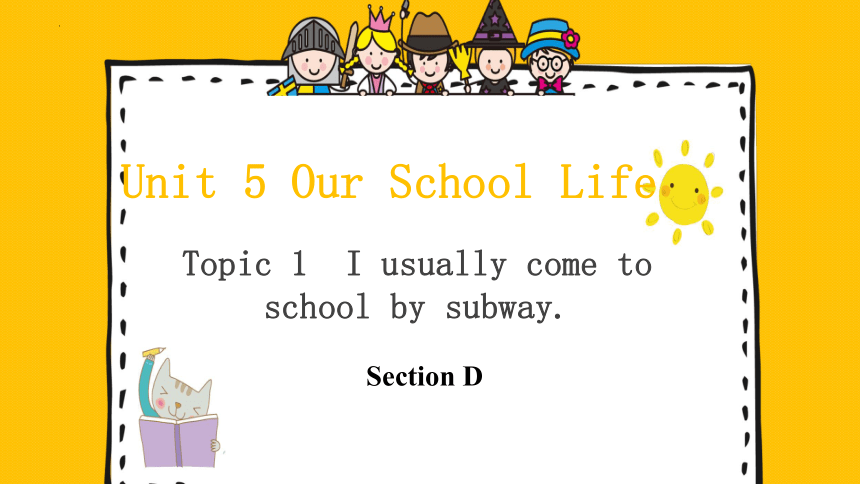 | |
| 格式 | zip | ||
| 文件大小 | 15.1MB | ||
| 资源类型 | 教案 | ||
| 版本资源 | 仁爱科普版 | ||
| 科目 | 英语 | ||
| 更新时间 | 2022-07-25 13:55:21 | ||
图片预览

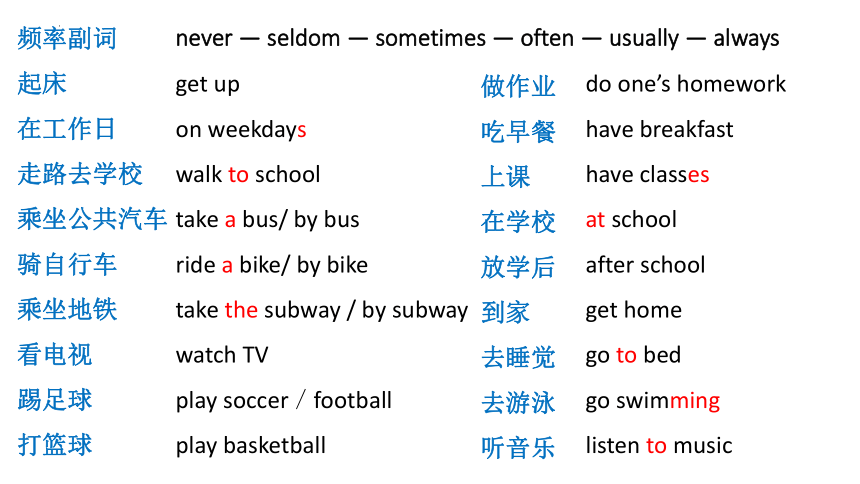
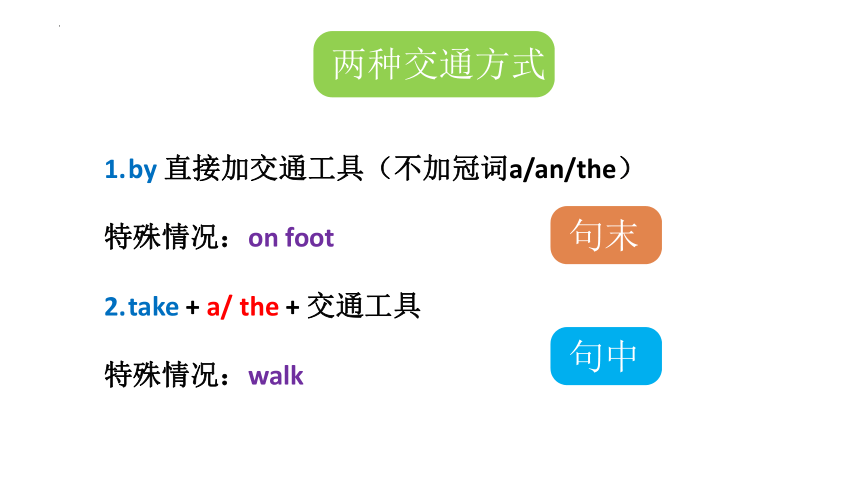
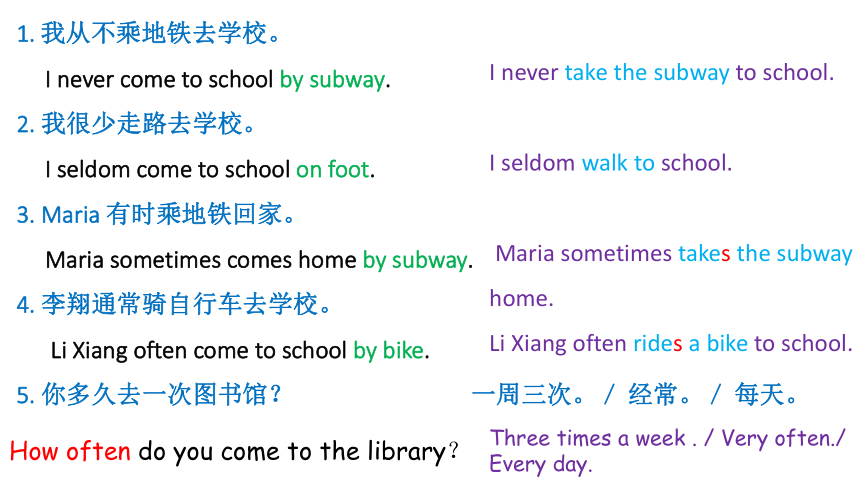
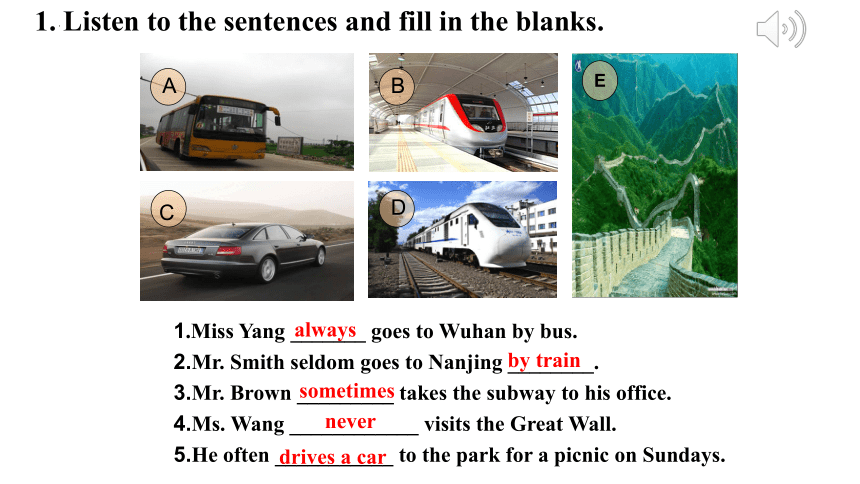
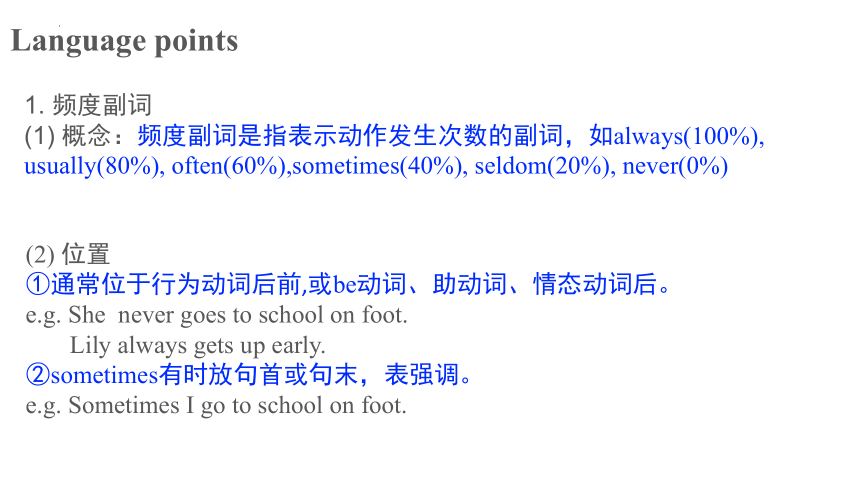
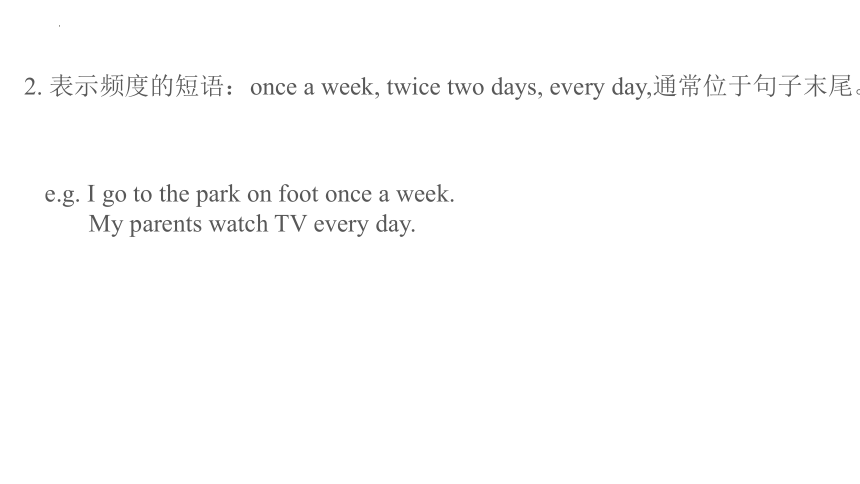
文档简介
(共17张PPT)
Unit 5 Our School Life
Topic 1 I usually come to school by subway.
Section D
频率副词
起床
在工作日
走路去学校
乘坐公共汽车
骑自行车
乘坐地铁
看电视
踢足球
打篮球
get up
on weekdays
walk to school
take a bus/ by bus
ride a bike/ by bike
take the subway / by subway
watch TV
play soccer/football
play basketball
做作业
吃早餐
上课
在学校
放学后
到家
去睡觉
去游泳
听音乐
never — seldom — sometimes — often — usually — always
do one’s homework
have breakfast
have classes
at school
after school
get home
go to bed
go swimming
listen to music
两种交通方式
by 直接加交通工具(不加冠词a/an/the)
特殊情况:on foot
take + a/ the + 交通工具
特殊情况:walk
句末
句中
我从不乘地铁去学校。
I never come to school by subway.
2. 我很少走路去学校。
I seldom come to school on foot.
3. Maria 有时乘地铁回家。
Maria sometimes comes home by subway.
4. 李翔通常骑自行车去学校。
Li Xiang often come to school by bike.
5. 你多久去一次图书馆? 一周三次。/ 经常。/ 每天。
I never take the subway to school.
I seldom walk to school.
Maria sometimes takes the subway home.
Li Xiang often rides a bike to school.
How often do you come to the library?
Three times a week . / Very often./ Every day.
1.Miss Yang _______ goes to Wuhan by bus.
2.Mr. Smith seldom goes to Nanjing ________.
3.Mr. Brown _________ takes the subway to his office.
4.Ms. Wang ____________ visits the Great Wall.
5.He often ___________ to the park for a picnic on Sundays.
always
never
by train
sometimes
drives a car
1. Listen to the sentences and fill in the blanks.
C
D
A
B
E
E
Language points
1. 频度副词
(1) 概念:频度副词是指表示动作发生次数的副词,如always(100%), usually(80%), often(60%),sometimes(40%), seldom(20%), never(0%)
(2) 位置
①通常位于行为动词后前,或be动词、助动词、情态动词后。
e.g. She never goes to school on foot.
Lily always gets up early.
②sometimes有时放句首或句末,表强调。
e.g. Sometimes I go to school on foot.
2. 表示频度的短语:once a week, twice two days, every day,通常位于句子末尾。
e.g. I go to the park on foot once a week.
My parents watch TV every day.
3. how often意为“多久一次”,用来询问某事发生的频率。
e.g. How often do you play sports
注意:
针对How often提问的答语可以是once / twice / three times… a week(一周几次);every day(每天);也可以是always, Never…
e.g. —How often do you watch TV
—Every evening / Twice a week / Seldom.
注意:
1.Always 和never互为反义词;
2.频度副词或短语不影响三单的判定;
3.频度副词和短语的位置不同;
4.对频度副词的提问用How often.
The interviewer and Michael are talking about the school ______ of ___________ students.
Listen and then fill in the blanks.
Listen and understand.
life
American
Read and understand.
How do American students usually go to school
2. Where do the students usually have lunch
3. What time is school over
4. What do they do after school
They usually take a yellow school bus or walk to school.
They usually have lunch at school.
At about 3 o’clock.
They often play basketball and soccer.
2. Read the interview again and answer the questions. Then act it out.
Key Points
be over 结束
2. Many students usually take a yellow school bus or walk to school.
3. I’m sorry we have no more time.
4. Nice talking to you.
I. 用方框中所给词的适当形式填空。
1. The girl likes ________ football games.
2. Tom always gets up _____ in the morning.
3. We usually see a movie _____ a week.
4. I often go __________ with my father on Sundays.
5. Lisa never _______ to music in class.
swim, watch, once, listen, early
watching
early
once
swimming
listens
Exercise
II. 单项选择。
1. —It’s 12 o’clock. It’s time ___. —OK, let’s go!
A. for breakfast B. for have lunch
C. have lunch D. to have lunch
2. Jason likes talking _____ kids. He thinks they are cute.
A. on B. with C. by D. in
3. —___ is the Olympics held —Every four years.
A. How often B. How long C. When D. How soon
4. —How many times do you go to the park a week
—Only ___ a week.
A. once B. one C. first D. two
A
B
A
D
Summary
We learn: 1. some words: great, wall, life, American,
over, more, talk
2. some phrases: the Great Wall, have lunch,
in the free time
3. some sentences:
I’m sorry we have no more time.
Nice talking to you.
We can: talk about the difference between the school life of American students and that of Chinese students.
Homework
1. Review adverbs and phrases of frequency.
2. Sum up the Present Simple Tense.
3. Memorize the new words and phrases.
Thank you!
Unit 5 Our School Life
Topic 1 I usually come to school by subway.
Section D
频率副词
起床
在工作日
走路去学校
乘坐公共汽车
骑自行车
乘坐地铁
看电视
踢足球
打篮球
get up
on weekdays
walk to school
take a bus/ by bus
ride a bike/ by bike
take the subway / by subway
watch TV
play soccer/football
play basketball
做作业
吃早餐
上课
在学校
放学后
到家
去睡觉
去游泳
听音乐
never — seldom — sometimes — often — usually — always
do one’s homework
have breakfast
have classes
at school
after school
get home
go to bed
go swimming
listen to music
两种交通方式
by 直接加交通工具(不加冠词a/an/the)
特殊情况:on foot
take + a/ the + 交通工具
特殊情况:walk
句末
句中
我从不乘地铁去学校。
I never come to school by subway.
2. 我很少走路去学校。
I seldom come to school on foot.
3. Maria 有时乘地铁回家。
Maria sometimes comes home by subway.
4. 李翔通常骑自行车去学校。
Li Xiang often come to school by bike.
5. 你多久去一次图书馆? 一周三次。/ 经常。/ 每天。
I never take the subway to school.
I seldom walk to school.
Maria sometimes takes the subway home.
Li Xiang often rides a bike to school.
How often do you come to the library?
Three times a week . / Very often./ Every day.
1.Miss Yang _______ goes to Wuhan by bus.
2.Mr. Smith seldom goes to Nanjing ________.
3.Mr. Brown _________ takes the subway to his office.
4.Ms. Wang ____________ visits the Great Wall.
5.He often ___________ to the park for a picnic on Sundays.
always
never
by train
sometimes
drives a car
1. Listen to the sentences and fill in the blanks.
C
D
A
B
E
E
Language points
1. 频度副词
(1) 概念:频度副词是指表示动作发生次数的副词,如always(100%), usually(80%), often(60%),sometimes(40%), seldom(20%), never(0%)
(2) 位置
①通常位于行为动词后前,或be动词、助动词、情态动词后。
e.g. She never goes to school on foot.
Lily always gets up early.
②sometimes有时放句首或句末,表强调。
e.g. Sometimes I go to school on foot.
2. 表示频度的短语:once a week, twice two days, every day,通常位于句子末尾。
e.g. I go to the park on foot once a week.
My parents watch TV every day.
3. how often意为“多久一次”,用来询问某事发生的频率。
e.g. How often do you play sports
注意:
针对How often提问的答语可以是once / twice / three times… a week(一周几次);every day(每天);也可以是always, Never…
e.g. —How often do you watch TV
—Every evening / Twice a week / Seldom.
注意:
1.Always 和never互为反义词;
2.频度副词或短语不影响三单的判定;
3.频度副词和短语的位置不同;
4.对频度副词的提问用How often.
The interviewer and Michael are talking about the school ______ of ___________ students.
Listen and then fill in the blanks.
Listen and understand.
life
American
Read and understand.
How do American students usually go to school
2. Where do the students usually have lunch
3. What time is school over
4. What do they do after school
They usually take a yellow school bus or walk to school.
They usually have lunch at school.
At about 3 o’clock.
They often play basketball and soccer.
2. Read the interview again and answer the questions. Then act it out.
Key Points
be over 结束
2. Many students usually take a yellow school bus or walk to school.
3. I’m sorry we have no more time.
4. Nice talking to you.
I. 用方框中所给词的适当形式填空。
1. The girl likes ________ football games.
2. Tom always gets up _____ in the morning.
3. We usually see a movie _____ a week.
4. I often go __________ with my father on Sundays.
5. Lisa never _______ to music in class.
swim, watch, once, listen, early
watching
early
once
swimming
listens
Exercise
II. 单项选择。
1. —It’s 12 o’clock. It’s time ___. —OK, let’s go!
A. for breakfast B. for have lunch
C. have lunch D. to have lunch
2. Jason likes talking _____ kids. He thinks they are cute.
A. on B. with C. by D. in
3. —___ is the Olympics held —Every four years.
A. How often B. How long C. When D. How soon
4. —How many times do you go to the park a week
—Only ___ a week.
A. once B. one C. first D. two
A
B
A
D
Summary
We learn: 1. some words: great, wall, life, American,
over, more, talk
2. some phrases: the Great Wall, have lunch,
in the free time
3. some sentences:
I’m sorry we have no more time.
Nice talking to you.
We can: talk about the difference between the school life of American students and that of Chinese students.
Homework
1. Review adverbs and phrases of frequency.
2. Sum up the Present Simple Tense.
3. Memorize the new words and phrases.
Thank you!
同课章节目录
- Unit 5 Our school life
- Topic 1 I usually come to school by subway.
- Topic 2 A few students are running around the play
- Topic 3 My school life is very interesting.
- Unit 6 Our local area
- Topic 1 Is there a computer in your study?
- Topic 2 My home is in an apartment building.
- Topic 3 Which is the way to the hospital?
- Review of Units 5-6
- Unit 7 The Birthday
- Topic 1 When is your birthday?
- Topic 2 Can you sing an English song?
- Topic 3 Everyone had a good time.
- Unit 8 The seasons and the Weathe
- Topic 1 What's the weather like in summer?
- Topic 2 The summer holidays are coming.
- Topic 3 Let’s celebrate!
- Review of Units 7-8
- 旧版资料
- Unit 5 Our School Life
- Unit 6 Our Local Area
- Unit 7 The Birthday
- Unit 8 The seasons and the Weathe
- Unit 7 Celebrating the Birthday(老版本)
